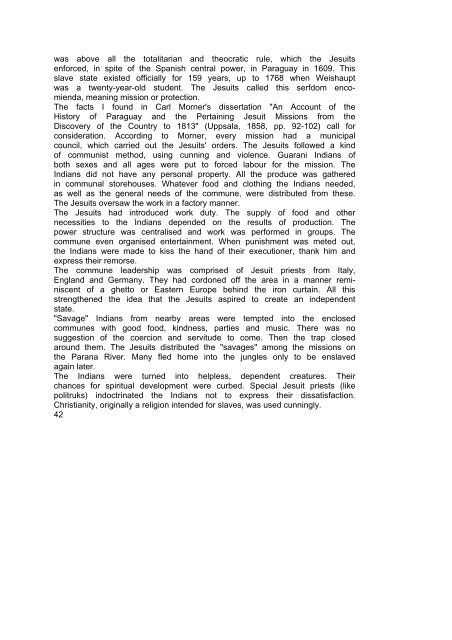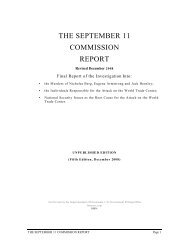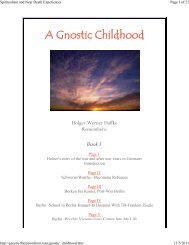- Page 2 and 3: CONTENTS Introduction 9 1.Myths Con
- Page 4 and 5: "Nobody knows that Zionism appeared
- Page 6 and 7: The reader will see that this descr
- Page 8 and 9: MYTHS CONCERNING FALSE COMMUNISTS A
- Page 10 and 11: the Christian era, bought foodstuff
- Page 12 and 13: a new coin to celebrate the massacr
- Page 14 and 15: The Bolsheviks had their own ten co
- Page 16 and 17: THE ILLUMINATI: TRIUMPH OF TREACHER
- Page 18 and 19: a loan for the purpose. The Pope ac
- Page 20 and 21: family. (Pouget de Saint Andres, "L
- Page 22 and 23: The Jesuits had taught Weishaupt mu
- Page 24 and 25: so to speak, Weishaupt's invisible
- Page 26 and 27: He gave Weishaupt the title of Priv
- Page 28 and 29: "History of the Order of the Illumi
- Page 30 and 31: Charity. Mozart's powerful friend,
- Page 32 and 33: contrasting lyrical and tragic them
- Page 34 and 35: 3. Successive transference of all p
- Page 36 and 37: Stone revealing how Jefferson explo
- Page 40 and 41: Another important Illuminatus, the
- Page 42 and 43: The Illuminati have managed to pres
- Page 44 and 45: served several courses for dinner.
- Page 46 and 47: the Masonic lodges - they had playe
- Page 48 and 49: Everything that was non-essential w
- Page 50 and 51: The Illuminati wanted to completely
- Page 52 and 53: The Illuminati's Way to World Power
- Page 54 and 55: Consequently, the Confederate presi
- Page 56 and 57: effect of absolute atheism, origin
- Page 58 and 59: dollar bills in 1933, 144 years aft
- Page 60 and 61: KARL MARX - EVIL'S IDOL On the 5th
- Page 62 and 63: So a god has snatched from me my al
- Page 64 and 65: Moses Hess quickly transformed youn
- Page 66 and 67: of changing mankind into a savage a
- Page 68 and 69: The Roman Emperor Marcus Ulpius Tra
- Page 70 and 71: Pierre Joseph Proudhon, Francois Ma
- Page 72 and 73: you have the conspiracy plain and c
- Page 74 and 75: society could only be ended by "a s
- Page 76 and 77: 1881), Georg Herwegh, Robert Blum,
- Page 78 and 79: The 18th of March became a special
- Page 80 and 81: The Second Wave, 1848-49 On the 12t
- Page 82 and 83: members of "the revolutionary Paris
- Page 84 and 85: uncontrolled drinking and his wild,
- Page 86 and 87: author was a careless and incompete
- Page 88 and 89:
they could use to justify any kind
- Page 90 and 91:
THE UNKNOWN VLADIMIR ULYANOV We hav
- Page 92 and 93:
damage, he had several nervous brea
- Page 94 and 95:
to which the revolutionaries were s
- Page 96 and 97:
In 1914, two Bolsheviks, Ivan Skvor
- Page 98 and 99:
In Sweden, the freemasons have succ
- Page 100 and 101:
(Rufin), chief of the Cheka (politi
- Page 102 and 103:
Krupskaya confirmed in her "Memoirs
- Page 104 and 105:
oat sank under the weight of all th
- Page 106 and 107:
people were executed during the per
- Page 108 and 109:
the stomachs of their victims, foll
- Page 110 and 111:
Richard Pipes at Harvard University
- Page 112 and 113:
the Cheka's claws. Later, Lenin beg
- Page 114 and 115:
fire on the workers if necessary, w
- Page 116 and 117:
which the Marxist terrorist Nikolai
- Page 118 and 119:
Lenin was entranced by violence - h
- Page 120 and 121:
efore the beginning of the New Econ
- Page 122 and 123:
and Trotsky, and not simply a resul
- Page 124 and 125:
of ways and entered his government
- Page 126 and 127:
1960 when a sensational book was pu
- Page 128 and 129:
Only in 1992 was it first revealed
- Page 130 and 131:
LEON TROTSKY - CYNIC AND SADIST Leo
- Page 132 and 133:
appreciated in Sweden by the histor
- Page 134 and 135:
The author Maxim Gorky characterise
- Page 136 and 137:
confirmed by the Finnish encyclopae
- Page 138 and 139:
lodge in Austria is called Maimonid
- Page 140 and 141:
The leaders of the revolution in 19
- Page 142 and 143:
On the 11th of April 1906, Peter Ru
- Page 144 and 145:
noble family and became the first c
- Page 146 and 147:
Trotsky Abroad Neither Trotsky nor
- Page 148 and 149:
chansky). The Canadians believed th
- Page 150 and 151:
The only difference is that this ty
- Page 152 and 153:
move, he must obey; if he refuses,
- Page 154 and 155:
All who dared criticise the only tr
- Page 156 and 157:
The reader will understand that it
- Page 158 and 159:
lind peasants and workers. Civil wa
- Page 160 and 161:
should not surrender the fleet to t
- Page 162 and 163:
15 points, in which they, among oth
- Page 164 and 165:
trapdoor into a waiting lorry. Then
- Page 166 and 167:
speech in the Soviet Union.", "It w
- Page 168 and 169:
must the Soviet Union detain an aut
- Page 170 and 171:
code). The GPU had then gathered to
- Page 172 and 173:
companions after this statement. So
- Page 174 and 175:
deed. He later changed his name to
- Page 176 and 177:
HOW THE COMMUNISTS SEIZED POWER The
- Page 178 and 179:
The Jewish periodical Hammer was un
- Page 180 and 181:
weakness." (Professor Z. A. B. Zema
- Page 182 and 183:
successfully) defended themselves a
- Page 184 and 185:
known as Astrakhan Tartars. Large a
- Page 186 and 187:
The freemasons began making intense
- Page 188 and 189:
The Austrian political scientist Ka
- Page 190 and 191:
and freemason Piotr Rutenberg, also
- Page 192 and 193:
The American press painted a monstr
- Page 194 and 195:
According to the author Hans Bjorke
- Page 196 and 197:
Stockholm's socialist mayor Carl Li
- Page 198 and 199:
known Zionist conspirator, Alexande
- Page 200 and 201:
The rabbi Isaac Wise (1819-1900), c
- Page 202 and 203:
There was one small newspaper, The
- Page 204 and 205:
Petrograd to Ganetsky in Stockholm
- Page 206 and 207:
fact that the Soviet propaganda lat
- Page 208 and 209:
Kerensky knew he had been exposed.
- Page 210 and 211:
suitable astrological time for the
- Page 212 and 213:
(Mikhail Heller and Alexander Nekri
- Page 214 and 215:
another fabrication, for the Winter
- Page 216 and 217:
of the women's battalion made no re
- Page 218 and 219:
All this goes to show that the Bols
- Page 220 and 221:
According to yet another myth in th
- Page 222 and 223:
June 1990 and finally fell in Augus
- Page 224 and 225:
use of common criminals as allies w
- Page 226 and 227:
quickly as possible and later expan
- Page 228 and 229:
thought it was formulated in such a
- Page 230 and 231:
The first chairman of the Central E
- Page 232 and 233:
of B'nai B'rith and the Grand Orien
- Page 234 and 235:
Union's most important diplomats we
- Page 236 and 237:
John Gates (actually Israel Regentr
- Page 238 and 239:
Three shiploads with a total of 540
- Page 240 and 241:
marriage laws stricter. Lenin made
- Page 242 and 243:
Socialist Party, which acted most i
- Page 244 and 245:
The German government spent a total
- Page 246 and 247:
THROUGH THE LABYRINTH OF MURDER It
- Page 248 and 249:
advance. Both murderers could freel
- Page 250 and 251:
The fact that Kannegisser admitted
- Page 252 and 253:
No other functionary was able to co
- Page 254 and 255:
Revolutionaries acting for the Brit
- Page 256 and 257:
semi-darkness. Her acquaintances ex
- Page 258 and 259:
with their lies and unnatural doctr
- Page 260 and 261:
Venyamin had emigrated to the Unite
- Page 262 and 263:
1919, in which he said that he had
- Page 264 and 265:
Bela Kun used to lend a hand at mow
- Page 266 and 267:
items and gems as they could possib
- Page 268 and 269:
Jimmy, to death with the butt of hi
- Page 270 and 271:
There was also another Jewish funct
- Page 272 and 273:
World War in 1916. The threat prese
- Page 274 and 275:
terror of the 1930s (Ohtuleht, 22nd
- Page 276 and 277:
The Jewish doctor and publicist Sal
- Page 278 and 279:
Po'alei Zion was founded in 1899 an
- Page 280 and 281:
since she, Kirov and Ordzhonikidze
- Page 282 and 283:
leadership. This support later cost
- Page 284 and 285:
wanted an examination, since his le
- Page 286 and 287:
Export-Import Co. Bridgeport, Conne
- Page 288 and 289:
Isaac Spiegelglas, was ordered to c
- Page 290 and 291:
carried out the demolition. It only
- Page 292 and 293:
disfigured by ugly pockmarks. Besid
- Page 294 and 295:
Three Jews, Lazar Kaganovich, Yakov
- Page 296 and 297:
Lazar Kaganovich and his accomplice
- Page 298 and 299:
and another 9200 to be imprisoned i
- Page 300 and 301:
Boris Berman inspects the prisoners
- Page 302 and 303:
outmanoeuvre Kaganovich. Beria hear
- Page 304 and 305:
The history of the Second World War
- Page 306 and 307:
Katyn were a German plot. Winston C
- Page 308 and 309:
The Murder of Stalin The leading Je
- Page 310 and 311:
An article by Stalin about the murd
- Page 312 and 313:
The Power Struggle After Stalin's D
- Page 314 and 315:
accused Kaganovich of the intention
- Page 316 and 317:
Their genetic make-up is destroyed.
- Page 318 and 319:
socialist) reforms. Wang Mang stren
- Page 320 and 321:
mason) was sent from London to Murm
- Page 322 and 323:
They were no longer given any suppo
- Page 324 and 325:
Antony Sutton pointed out that the
- Page 326 and 327:
of March 1918 that Trotsky wanted f
- Page 328 and 329:
It is therefore hardly surprising t
- Page 330 and 331:
The cruel War Communism did not wor
- Page 332 and 333:
Government Politics) on the 6th of
- Page 334 and 335:
electrify Russia through the buildi
- Page 336 and 337:
250 000 tractors were needed for th
- Page 338 and 339:
The international financial elite w
- Page 340 and 341:
plant. The aeroplane engines and th
- Page 342 and 343:
Moscow had earlier bought aeroplane
- Page 344 and 345:
about this and a counterattack plan
- Page 346 and 347:
army soldier-shirts until 1970. A p
- Page 348 and 349:
Patton with a metal projectile from
- Page 350 and 351:
Union. Less than half- 1750 - of th
- Page 352 and 353:
slavery been as cruel and inhuman."
- Page 354 and 355:
was able to take Madrid on the 28th
- Page 356 and 357:
ecapture all the areas Finland had
- Page 358 and 359:
Gleason, New Britain Machine Compan
- Page 360 and 361:
The Soviet Union's military expense
- Page 362 and 363:
the annual growth rate had decrease
- Page 364 and 365:
Union. In 1991, between 14 and 19 b
- Page 366 and 367:
from Viktor Grushko, the vice-chief
- Page 368 and 369:
The United States refused to give t
- Page 370 and 371:
The Chinese Marxist Sun Yatsen (Sun
- Page 372 and 373:
that the total number of Chinese ki
- Page 374 and 375:
commented upon by the Jewish nation
- Page 376 and 377:
countries. New Jewish Chekists arri
- Page 378 and 379:
the worst mass-murderer in the mode
- Page 380 and 381:
The Jews Dr Gens and Leo Aisenstadt
- Page 382 and 383:
disappeared in 1940 alone. I lack t
- Page 384 and 385:
Their percentage of the population
- Page 386 and 387:
The Soviet-Estonian periodical Vike
- Page 388 and 389:
Against Palestinians" (Svenska Dagb
- Page 390 and 391:
Gramberg, were overjoyed by this co
- Page 392 and 393:
The Soviet propaganda constantly ac
- Page 394 and 395:
deficiency disorders, once more tri
- Page 396 and 397:
in peace. The Soviet Union perished
- Page 398 and 399:
Lately Russia has begun pointing ou
- Page 400 and 401:
thousands of men and women who died
- Page 402 and 403:
same thing to the author Lars Gusta
- Page 404 and 405:
The Hungarian author and Member of
- Page 406 and 407:
The financial elite has already suc
- Page 408 and 409:
Bolivia's economy in the 1980s. The
- Page 410 and 411:
happened to the foremost expert on
- Page 412 and 413:
The same financial and Masonic forc
- Page 414 and 415:
Conquest, Robert, "Harvest of Sorro
- Page 416 and 417:
Martin-Saint-Leon, Etienne, "Les De
- Page 418 and 419:
Trotsky, Leon, "Problems of the Dev
- Page 420 and 421:
Kommunist, Kharkov, 12th April 1919







